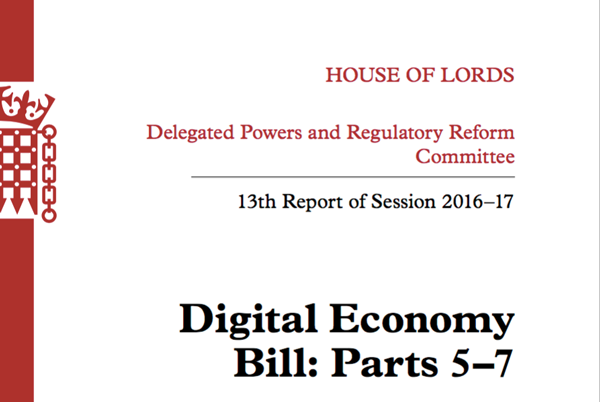Lords Committee slams data sharing powers in Digital Economy Bill
 In a report published today the Committee asks for the “almost untrammeled” powers given to Ministers in the Bill to be severely curtailed, and for all Codes of Practice associated with these data sharing powers to be laid before Parliament in draft for full approval before coming into force.
In a report published today the Committee asks for the “almost untrammeled” powers given to Ministers in the Bill to be severely curtailed, and for all Codes of Practice associated with these data sharing powers to be laid before Parliament in draft for full approval before coming into force.
The Committee “consider it inappropriate” for Ministers to have the powers to define lists of specified persons and non-specific purposes related to public service provision, fraud or debt. Instead, they argue that those given the powers to share data and the purposes for which it is used should be on the face of the Bill, with Ministers only able to make very limited additions based on a clear necessity.
We can see that the Government will resist such a move, as that level of flexibility appears central to their approach to data sharing. If they plan to ignore these recommendations, the Cabinet Office will need to include much stronger safeguards on the face of the Bill about the criteria and processes for inclusion in the data gateways.
The report also raises concerns with the onward disclosure of shared data, which is subject to very broad exemptions for the purposes of crime, anti-social behaviour or legal proceedings.
The Committee starkly sets out that the data shared under these powers for benign social services could be used to bring criminal proceedings against the same individuals without restriction. This was always a red line during the open policy making pre legislative discussion where ORG participated. ORG has proposed various amendments to narrow down these further reuses of data, but we may have to revisit our proposals to further tighten them up.
We particularly welcome the Committee’s recommendations made on the Codes of Practice. The Government has so far refused to put key safeguards on the use of the powers on the face of the Bill, leaving these to the Codes. The Committee is under no doubt that the Codes are “legislative” in nature, despite the arguments by the government that these are not legally enforceable.
The report demands that the Codes are laid in draft form in front of Parliament for discussion and affirmative approval, and not just presented for filing in the statute book. They concede that further modifications could be made by negative procedure. Clarity on the full legal status of the Codes is critical, and we can only hope the Government will heed these recommendations, which chime with those of many others including ORG.
The Committee ask for various so-called “Henry VIII powers” peppered throughout the Bill to be narrowed down. These kind of powers add a provision to a Bill which enables the Government to repeal or amend it after it has become an Act of Parliament, and are an anachronism meant to be used sparingly for very narrow purposes. The Committee finds that some of these powers could be useful here to stop data sharing and narrow down future provisions, but the way they are written they could be used to expand the powers in the Bill without any accountability.
The report also tackles a fairly technical but potentially important point that ORG and others engaged in their process had missed so far: the so-called “dehybridisation clauses”. A Hybrid Instrument is a piece of legislation that disproportionately affects a particular group of people within a class. The clauses in the Bill simply state that this should be disregarded. This can be important due to an obscure provision in the House of Lords that gives those who are specially and directly affected by Hybrid Instruments
the opportunity to present their arguments against the SI [statutory instrument] to the House of Lords Hybrid Instruments Committee and then, possibly, to a select committee charged with reporting on its merits and recommending whether or not the SI should be approved by both Houses of Parliament. The hybrid instrument procedure is unique to the House of Lords and the process must be completed before the SI can be approved by both Houses.
We can see why the Government would want to remove this provision to speed up legislation, but it seems unfair and potentially abusive to simply decree that what may be a hybrid instrument should not be treated as such, thus denying those affected their right to make their case.
